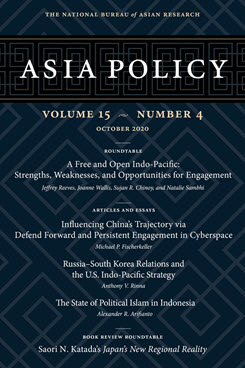Russia–South Korea Relations and the U.S. Indo-Pacific Strategy
This essay analyzes Russia–South Korea relations in the context of Russia-U.S. great-power tensions and the U.S. Indo-Pacific strategy.
EXECUTIVE SUMMARY
MAIN ARGUMENT
As part of its Indo-Pacific strategy, the U.S. considers Russia to be a “revitalized malign actor.” Given that the U.S. alliance with South Korea is critical for the strategy, the Russia–South Korea strategic partnership affects broader Russia-U.S. great-power competition. Moscow’s pursuit of increased influence in East Asia, combined with Seoul’s middle-power foreign policy, has created a situation where Russia and South Korea have reached a degree of policy alignment that contrasts with U.S. policies, such as those regarding North Korea. Although this alignment has not created a situation in which South Korea will be forced to balance between Russia and the U.S. in the same way that it must navigate the China-U.S. rivalry, it nevertheless potentially poses complications for the relationship between South Korea and the U.S.
POLICY IMPLICATIONS
- The Korean Peninsula is one of the Indo-Pacific strategy’s geographic areas where Russia-U.S. great-power tensions have notably manifested. This has the potential to expand friction between Moscow and Washington—originating primarily in Europe—into the Indo-Pacific region.
-
South Korea’s economic prowess and Moscow’s desire for sound ties with Seoul for the purposes of economic development have promoted a situation in which South Korea enjoys considerable leverage in its ties with Russia, thus mitigating Seoul’s vulnerability to Moscow in terms of great-power tensions between Russia and the U.S.
-
If Moscow and Seoul increase their economic collaboration, policy alignment between Russia and South Korea that includes economic cooperation with North Korea could place stress on the U.S.–South Korea alliance, particularly because of the economic-security nexus built into South Korea–Russia relations.
Anthony V. Rinna is a Senior Editor at Sino-NK, a research website dedicated to producing academic research on Northeast Asia for popular consumption. He specializes in Korea-Russia relations and the China-Russia strategic partnership. He has been a resident of South Korea since 2014.
About Asia Policy
Asia Policy is a peer-reviewed scholarly journal presenting policy-relevant academic research on the Asia-Pacific that draws clear and concise conclusions useful to today’s policymakers. Asia Policy is published quarterly in January, April, July, and October and accepts submissions on a rolling basis. Learn more


